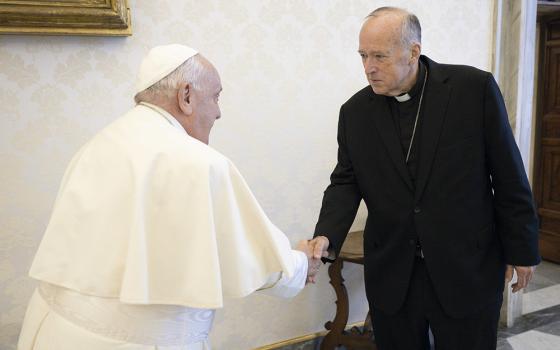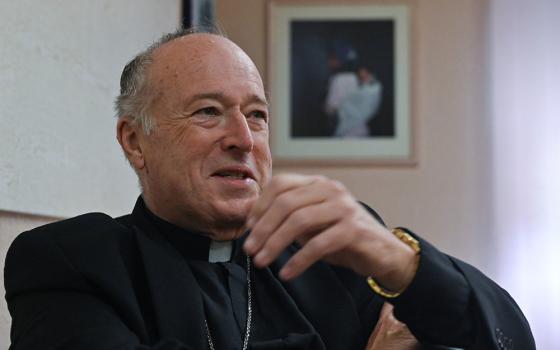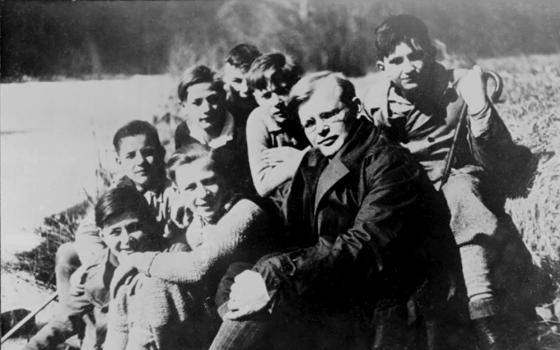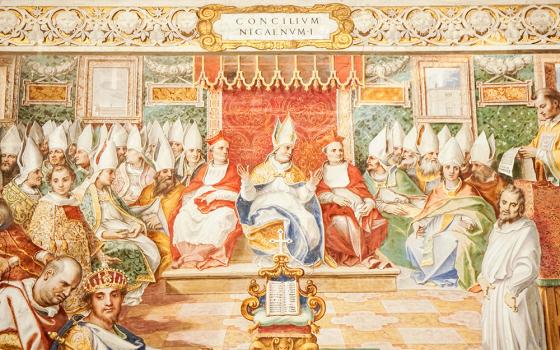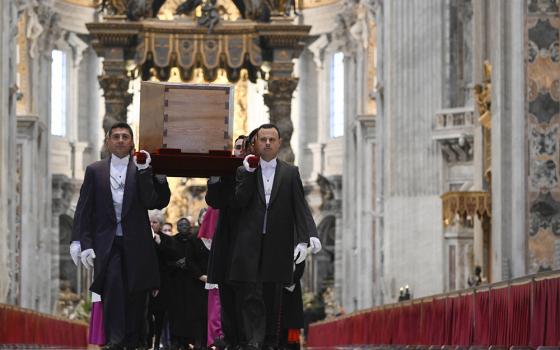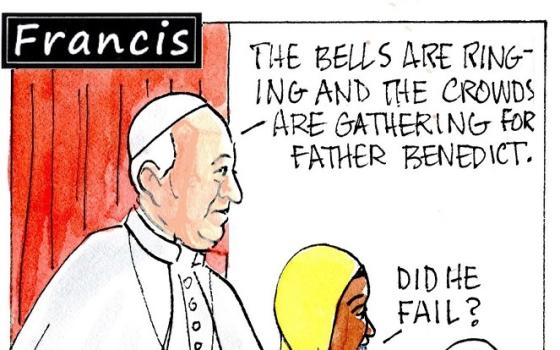Pope Benedict XVI leads his last public Angelus from the window of his apartment overlooking St. Peter's Square at the Vatican Feb. 24, 2013. He resigned the papacy four days later, the first to do so voluntarily in more than 700 years. (CNS/Vatican Media)
It is a strange quality of Pope Benedict XVI's pontificate that he will be known to history first and foremost for the means by which he exited his office, a voluntary resignation, something not seen in centuries. That resignation was a great act of demystification, a recognition that the papacy was an office, a very special office to be sure, but an office nonetheless. It was also an implicit, unspoken rebuke to John Paul II's contrary decision to hold on to office despite the incapacities of old age.
The day Cardinal Joseph Ratzinger was elected pope, April 19, 2005, a bishop who knew him observed, "Remember, Benedict the pope is not the same thing as Ratzinger the cardinal." This enigmatic comment turned out to be profoundly true, and true in ways that highlighted the successes and the failures of the papacy that followed.
At its simplest, the observation was a recognition that being prefect for the Congregation for the Doctrine of the Faith had been a desk job, and until he was elected pope, we never saw pictures of Ratzinger with children or in any pastoral setting. At its most complex, it was a recognition that Ratzinger's relationship to the entire life of the church, including to theology, was transformed by his election as pope.
And, so, the man who had been entrusted with the delicate task of removing those who sexually abused minors from the clergy, and had spent years reading dossiers that would sicken any decent person, was finally able to move against those whom John Paul II had protected, serial abusers like Fr. Marcial Maciel, founder of the Legionaries of Christ. The idea of holding accountable bishops who covered up abuse, however, was a bridge too far for the German pontiff, so his legacy on the issue of clergy sex abuse is decidedly mixed, better than that of his predecessor, but still inadequate.
As prefect at the CDF, Ratzinger had been instrumental in silencing theologians who failed to meet his standards of orthodoxy. As pope, he was more forgiving. Soon after his election, he hosted Swiss theologian Fr. Hans Küng, whose license to teach Catholic theology had been revoked by the Vatican with Ratzinger's acquiescence, at Castel Gandolfo where the two old colleagues and rivals had a four-hour meeting, including dinner, that the Vatican described as "friendly." Küng told NCR after the meeting: "It's clear that we have different positions. But the things we have in common are more fundamental. We are both Christians, both priests in service of the church, and we have great personal respect for one another."
Italian Cardinal Tarcisio Bertone kisses the ring of Pope Emeritus Benedict XVI as he arrives for a consistory led by Pope Francis in St. Peter's Basilica at the Vatican Feb. 22, 2014. At right is Cardinal Angelo Sodano. It was Pope Benedict's first public appearance at a liturgy since his retirement a year earlier. (CNS/Paul Haring)
Arguably, the most important quality in an effective pope is judgment of character, and specifically the ability to get the right person in the right job. Here, Benedict's legacy was uneven. In selecting San Francisco Archbishop William Levada to succeed him as prefect at the CDF, Benedict found someone exceedingly capable and not the least overwhelmed by the enormity of having to report weekly to the person who had held the post for 25 years. On the other hand, Benedict's loyalty to Cardinal Tarcisio Bertone, his secretary of state, was entirely misplaced, as Bertone was engulfed in both the leaks scandal and questions about his misuse of funds.
The most egregious example of Benedict failing to recognize the inadequacy of certain traditional methods for the managerial needs of a modern papacy was his appointment of Archbishop Carlo Maria Viganò as nuncio to the United States. This was a classic case of "promote to remove," in which Viganò's enemies got him transferred to Washington after he caused a stir alleging malfeasance in the governance of the Vatican City State. Viganò implored Benedict to let him stay in Rome, made clear his intense dislike for the United States, but Benedict moved him anyway. It was a disastrous decision.
The damage Viganò did in the U.S. church is incalculable. Any nuncio is going to get about half his nominations for episcopal appointments through, and Viganò's list includes the appointments of Archbishop Salvatore Cordileone to San Francisco; Bishop Michael Barber to Oakland; Bishop Michael Olson to Fort Worth, Texas; Archbishop Alexander Sample to Portland, Oregon; Bishop Thomas Daly to Spokane, Washington; and Bishop Joseph Strickland to Tyler, Texas. Each appointment reflects a backward vision of the Catholic Church, in which a supposed Golden Age before Vatican II is to be aped. Buskins and birettas are dusted off, priests face the wall, tabernacles are put back behind the altar of sacrifice, the world is kept at a distance, and any engagement with modernity is done from a defensive crouch.
Pope Benedict XVI greets youths at the Missionaries of Charity Peace and Joy Center in Cotonou, Benin, Nov. 19, 2011. (CNS/Paul Haring)
These lousy personnel decisions were accompanied by some terrible administrative ones. Benedict's 2007 decision to liberalize access to the Tridentine rite with the motu proprio Summorum Pontificum backfired badly, based on a reflexive tendency to assume the best about conservative Catholics. "He never intended to start a movement," one of his collaborators told me a few years after the decision. It was worse than that. The decision launched an ideology, one that increasingly denied the legitimacy of the Second Vatican Council.
Similarly, his 2012 decision to investigate the Leadership Conference of Women Religious displayed a reflexive tendency to believe the worst about the Catholic left. The humiliation of women who had given their lives to the church, proclaiming the Gospel by their work in education and health care and other ministries, was boneheaded, even if the result was not as bad as some people feared.
It is in the area of theology, however, that Joseph Ratzinger made his most significant contributions. His 1966 book Introduction to Christianity remains, like Küng's On Being a Christian, the kind of accessible theological work you can hand to a smart teenager or college student to help them grasp what being Catholic is all about — much better than giving them a copy of the catechism. His trilogy Jesus of Nazareth, published while he was pope, similarly offers B+ Catholics a series of reflections on the person of Jesus Christ that is both provocative and undoubtedly orthodox. Some curial officials complained that popes need to govern the church, not write books, and it would have been better for the church if Benedict had first hired someone more competent than Bertone to run the show, but these books will endure.
Advertisement
As CDF prefect, Ratzinger's fundamental problem was to mistake a theoretical issue for a practical or pastoral one. His concern about the "dictatorship of relativism" was not wrong, but he spoke about it as an intellectual challenge, which it is, but failed to see the ways participation in the consumerist, market economy was the real pastoral incubator for relativism. Similarly, his criticisms of liberation theology were well-founded — the theological anthropology really was lacking in some of the works criticized by the CDF — but those concerns were not advanced by the clumsy method of public condemnation.
As pope, Benedict made two enduring contributions to theology. His 2005 encyclical, Deus caritas est, continued the Christological focus that was a hallmark of Vatican II. Indeed, this last pope to have attended Vatican II always insisted, and rightly, on the primary focus on the person of Christ as the touchstone of Vatican II's soteriological, ecclesiological and anthropological teachings.
His 2009 encyclical, Caritas in veritate, building on the Christology of his prior work, insisted on the need to integrate notions of grace and gratuitousness into our Catholic social teaching, a profound challenge to modern economic and political assumptions. In this regard, it was more radical, and more compelling, than any work produced by a liberation theologian. The church is still only beginning to wrestle with the implications of this insight from Pope Benedict, and it is impossible to see how we will ever embrace Pope Francis' call to ecological stewardship without first more deeply receiving this teaching on grace and gratuitousness from his predecessor.
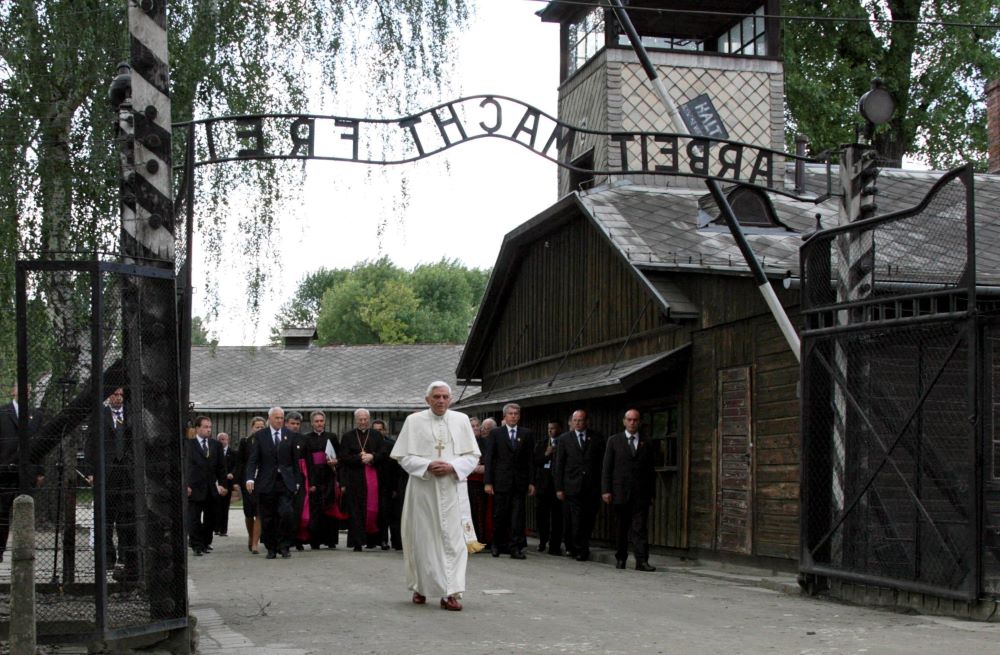
Pope Benedict XVI walks through the gate of Auschwitz, the former Nazi death camp in Poland, in this May 28, 2006, file photo. His visit to Poland paid tribute to his predecessor, Pope John Paul II. (CNS/Reuters/Pawel Kopczynski)
A final note. Like John Paul II, Pope Benedict's commitment to combating antisemitism was remarkable. To have a pope born within miles of Auschwitz, followed by one born in Hitler's Germany, both visit concentration camps to denounce the scourge of antisemitism, to visit with Jewish leaders when they made pastoral visits, to encourage Catholic-Jewish and Catholic-Muslim dialogues, to go to Jerusalem — these were fruits of the council. Any one of these acts were unimaginable in the church of Pius IX or Fr. Charles Coughlin. That all of them came to pass in the late 20th and early 21st centuries is astounding.
Pope Benedict's legacy, then, is a mixed one. A shy man thrust into the limelight, he proved unequal to some of the administrative challenges of running a universal church even while many of his theological contributions will endure. He made mistakes, some of them large ones, but his integrity was beyond reproach. In retirement, Benedict was demonstrably loyal to Pope Francis, and if his loudest champions in the U.S, had followed his example, the Catholic Church in this country would be far less polarized.
Mostly, Pope Benedict will be remembered as a profoundly intelligent and prayerful man, called to leadership during a time of turmoil in a church, who was not really suited for such rough waters. Through those waters, he steered the barque of Peter faithfully, if not always successfully.

